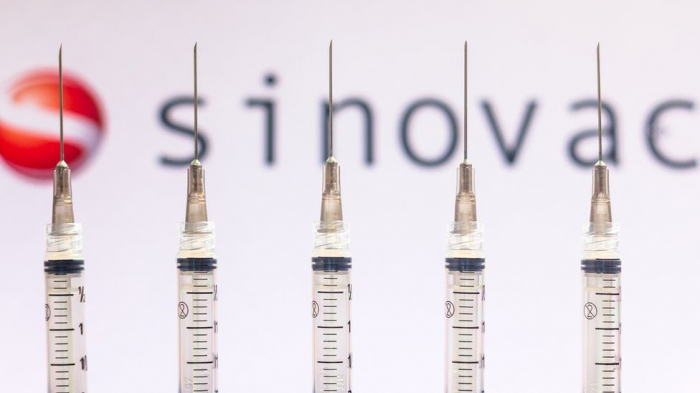As the global race to produce a Covid-19 vaccine continues, China appears to have made huge strides, with one of its vaccine front-runners, Sinovac, already making its way abroad.
Shipments of Beijing-based biopharmaceutical company Sinovac's Covid-19 vaccine Coronavac have arrived in Indonesia in preparation for a mass vaccination campaign, with another 1.8m doses due to arrive by January.
But the vaccine is yet to finish its late-stage trials, which begs the question: what exactly do we know about this Chinese vaccine?
What's the difference between Sinovac and some other vaccines?
CoronaVac is an inactivated vaccine, which works by using killed viral particles to expose the body's immune system to the virus without risking a serious disease response.
The Moderna and Pfizer vaccines are mRNA vaccines - which means part of the coronavirus' genetic code is injected into the body, triggering the body to begin making viral proteins, but not the whole virus, which is enough to train the immune system to attack.
"CoronaVac is a more traditional method [of vaccine] that is successfully used in many well known vaccines like rabies," Associate Prof Luo Dahai of the Nanyang Technological University told the BBC.
"mRNA vaccines are a new type of vaccine and there is [currently] no successful example [of them] being used in the population," Prof Luo adds.
On paper, one of Sinovac's main advantages is that it can be stored in a standard refrigerator at 2-8 degrees Celsius, like the Oxford vaccine, which is made from a genetically engineered virus that causes the common cold in chimpanzees.
Moderna's vaccine needs to be stored at -20C and Pfizer's vaccine at -70C.
It means that both Sinovac and the Oxford-AstraZeneca vaccine are a lot more useful to developing countries which might not be able to store large amounts of vaccine at such low temperatures.
How effective is it?
It's hard to say at this point in time. According to scientific journal The Lancet, we currently only have information from the first and second phase trials of CoronaVac.
Zhu Fengcai, one of the paper's authors, said those results - which are based on 144 participants in the phase one trial and 600 in the phase two trial - meant the vaccine was "suitable for emergency use".
In September, Mr Yin of Sinovac said tests were performed on more than 1,000 volunteers, of which "some only showed minor fatigue or discomfort… no more than 5%".
It began late-stage trials in Brazil - which has reported the second-highest death toll in the world - earlier in October. These trials were briefly halted in November after the reported death of a volunteer, but resumed after the death was found to have no links to the vaccine.
Sinovac's partner in Brazil, The Butantan Institute, said it expects Sinovac to publish results from its trials before 15 December.
Sao Paulo Governor Joao Doria (C), Sao Paulo state Health Secretary Dr. Jean Gorinchteyn (L), and Butantan Institute Director Dimas Covas (R), pose for photos next to a container carrying doses of the CoronaVac vaccine at Guarulhos International Airport in Guarulhos, near Sao Paulo, Brazil, on December 03, 2020.
Prof Luo explains that it is difficult to make comments about the vaccine's efficacy at this point in time "given the limited information available".
"Based on the preliminary data... CoronaVac is likely an effective vaccine, but we do need to wait for the results of the phase three trials," he said.
"These trials are randomised, observer-blind, placebo-controlled... with thousands of participants. This is the only way to prove a vaccine is safe and effective to be used at the population level."
How many doses can they produce a year?
Sinovac will be able to produce 300 million doses a year in its newly built 20,000 sqm production plant, its chairman told state media outlet CGTN.
Like all the other vaccines, it requires two doses, which means it is currently only able to inoculate 150m people a year - just over a tenth of China's population.
However, it has already delivered doses to Indonesia, and Sinovac has secured other deals with Turkey, Brazil and Chile.
Analysts point to China's bid to win the vaccine diplomacy race, which has also reportedly seen China's President Xi Jinping pledged to set aside $2bn for the African continent, while also offering Latin American and Caribbean countries a $1bn loan to buy vaccines. It's unclear what the terms of such a deal might be.
"Beijing... will surely leverage the provision of this live-saving technology for commercial and diplomatic profit," Jacob Mardell, an analyst from MERICS, told ABC news.
"[It] possesses something countries dearly need and will seek to paint the vaccine's provision as an act of charity."
It's not clear how much it might cost, but earlier this year, the Chinese city of Jiaxing offered two doses of the vaccine for 200 yuan ($29.75; £22) per dose. Bio Farma, a state-owned firm in Indonesia said it would cost around 200,000 rupiah ($13.60; £10) locally.
That is still far higher than the Oxford vaccine, which costs $4 a dose, but lower than Moderna's at $33 per dose. Moderna has said it aims to ship 500 million doses in 2021 and AstraZeneca has said it will produce 700 million doses by the end of the first quarter of 2021.
BBC
More about: Sinovac coronavirus
















































